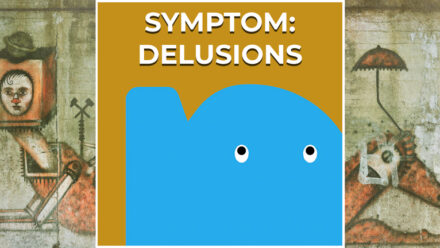
Jumping out of the car while you’re driving at full speed. Pinching your baby niece really hard. Kicking your pet. Having sex with your grandparent. These are intrusive thoughts. Pretty strange and scary thoughts you would never do or even say out loud, that might just pop up in your head.
These kinds of bizarre thoughts happen to almost everybody once in a while. About three-quarters of people who have some background with psychosis also have experienced intrusive thoughts.
Intrusive thoughts are only a problem when they really bother you
You can be very shocked by your own thoughts and feel embarrassed because of them. But usually these are just fleeting thoughts that come and go. They are not really bothering you. It only becomes a problem when scary or bizarre thoughts, images or impulses keep coming back and you can’t get them out of your head. You start feeling more and more guilty, dirty or afraid. You can try to suppress the thought, but that has been proven not to help – or even make it worse.
Your brain can’t register the word ‘not’
When you hear a word, the brain immediately makes all sorts of links, connections and feelings. The brain does not recognise the word ‘not’ as a denial. A well-known example is: do not think about pink elephants! So what are you thinking about? Exactly, pink elephants… In the same way, trying to suppress annoying intrusive thoughts only makes them worse.
Why do people get intrusive thoughts?
Why do people get strange thoughts and why do some get them more often than others? The causes are unknown. We do know that people who suffer from their intrusive thoughts, try everything they can to avoid them. Imagine that you take the train to work every day and you keep thinking about jumping in front of the train every time it approaches. It is pretty scary when this thought will not go away. You might become afraid you are really going to do it one day. Or wonder if maybe deep down inside, you really desire this. It might be a reason to take the bus from now to ‘avoid’ the intrusive thoughts.
What does work against intrusive thoughts?
First of all, it is good to realise that having intrusive thoughts from time to time is quite normal. Everybody at some point thinks: what would happen if I jump, suddenly punch or choke someone or scream in a silent room? Scientists believe you can consider these thoughts as warnings. You are thinking of something you could do, but don’t want to do and your brain imagines the complete picture. You are seeing the unwanted consequences with your mind’s eye and consider this as a warning NOT to do this. Quite useful actually.
Because trying to stop the thought does not work, you can either just ignore it, or instead greatly magnify the thought. If your intrusive thoughts are really bothering you, it is important to talk about them with someone you trust.
If the intrusive thoughts are compulsive, are making you unable to function normally, if the intrusive thoughts are becoming an obsession, discuss this with a care worker. About three-quarters of people with psychosis have these kinds of thoughts. Cognitive Behavioural Therapy and possibly medication can help you bring intrusive thoughts back to normal proportions.




